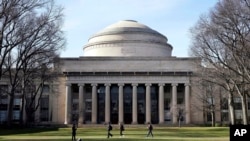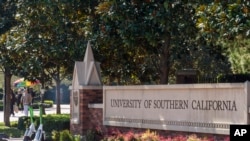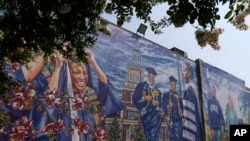Student Union
Tuition Decreases, Donations Bring Students Relief
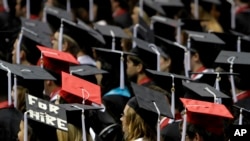
After decades of tuition increases at U.S. colleges and universities that have led to increased student debt and pushback from students and their families, some schools are reducing costs.
At the University of Michigan — ranked among the top public universities in the U.S. — free tuition will be extended at its Flint and Dearborn campuses. Called the Go-Blue guarantee, the offer applies to new full-time students residing in Michigan with a 3.5 grade-point average (GPA) on a 4.0 scale, with a family income of $65,000 or less or assets of less than $50,000.
The University of Michigan has 6,666 international students, according to the university's International Center, and the state has a large Arab population.
"Not only will most in-state undergrads see no change in their net tuition costs, we estimate that more than a quarter will pay no tuition at all," University President Mark Schlissel said.
Clinton College, a historically black college (HBCU) in South Carolina, is cutting tuition in half for its students this fall and will give every student a new computer tablet. Associate Vice President of Student Enrollment Jocelyn Biggs said the COVID-19 pandemic has created hardships.
"This is our way of saying you can still go to college at a reduced tuition amount and we're here to help," Biggs said.
Tuition for full-time students living on campus is $10,165 per semester and $5,240 for those living off-campus. Clinton College was one of many schools established by the African Methodist Episcopal Zion Church during Reconstruction after the U.S. Civil War, to help eradicate illiteracy among freedmen, according to its website. It has operated for 120 years.
The Kentucky Community and Technical College will maintain tuition from last year's rates.
"The board wanted to help students, and we felt keeping our tuition at the same rate would help thousands of families," Board Chair Gail Henson said in a news release.
Out-of-state students from counties contiguous to Kentucky pay $358 per credit hour. All other out-of-state students pay $627 per credit hour. International students typically pay out-of-state rates.
Tuition for in-state students at the University of Maine also will not increase in the coming academic year. The university has more than 600 international students from 70 countries and offers generous scholarships to those students, according to its website. Maine has a significant immigrant population from Africa.
The University of South Carolina announced it will freeze tuition at last year's rates. Other universities are issuing increases of about 1% to 2%.
The cost of tuition and fees at U.S. colleges and universities is the No. 1 reason that international students seek higher education elsewhere, in places such as Canada, Australia and New Zealand, according to the Institute of International Education (IIE). Those countries have been trying to attract foreign students through less expensive tuition and fees since enrollment in U.S. schools began to slide three years ago.
"The costs of U.S. higher education remain a perennial challenge in attracting international students, with 55.1% of institutions citing costs as one of the reasons for falling new student enrollment," according to IIE's Open Door report released in November 2019.
Celebrity donations recently have contributed to some students being able to study for less.
Yale University recently received a $150 million donation from David Geffen, a Hollywood business magnate, to the newly renamed David Geffen School of Drama at Yale. As a result, the university dropped its tuition for any student pursuing a degree or certificate in drama. It will allow the drama school to eliminate tuition for all degree and certificate programs, the university said.
Another billionaire, MacKenzie Scott, philanthropist and former wife of Amazon CEO Jeff Bezos, has made three rounds of donations to 286 organizations, including U.S. colleges and universities, totaling $8 billion.
Those schools include Borough of Manhattan Community College in New York City, College of the Desert in California, Florida International University in Miami (FIU), the University of Central Florida in Orlando (UCF) and Broward College in Fort Lauderdale.
In the case of UCF, the gift was the largest in the school's 58-year history.
In 2020, Scott made two similar surprise announcements in which she donated a combined $6 billion to fund COVID-19 relief, gender equity, historically Black colleges and universities and other schools.
The gift will help UCF toward its goal of becoming the world's leading public metropolitan research university, said UCF President Alexander Cartwright.
"The gift is a sign of trust and validation of our direction, and of the promising work that lies ahead for us and all our partners," a statement from Broward College said. "We send a tremendous thank you to MacKenzie Scott for this gift that will create economic mobility in Broward County for generations to come."
"This generous gift is a game-changer for FIU and our students' success for generations to come," said Mark Rosenberg, FIU's president. "Ms. Scott, [her husband] Mr. [Dan] Jewett and their team have taken note of our work serving a diverse student body and developing evidence-based strategies that have proven effective in helping our students succeed. This gift allows us to augment programs that we know work, develop models that can be replicated elsewhere, lift communities and combat poverty."
Twitter user @ramblingroses8 tweeted, "I don't know what I'd tell a kid today. I absolutely needed college because I'm an intellectual who wanted to explore ideas. it didn't make me much $ in the long run, but it was worth it to me. I did it on many jobs, aid & student loans, but it wasn't this expensive."
Some information for this report came from The Associated Press.
See all News Updates of the Day
Malaysian official: Schools can’t turn away from global tensions

Zambry Abdul Kadir, Malaysia’s higher education minister, said protests spreading across universities in the United States show that schools can’t ignore political tensions.
Helen Packer, reporting in Times Higher Education, said the minister reminded educators that universities are key in the development of leaders, individuals and societies. (April 2024)
Social media breaks are difficult, but necessary

Between online classes, maintaining social connections and working on projects, college students can have a hard time disengaging from the demands of technology.
In Florida International University’s PantherNOW, Ariana Rodriguez offers strategies for taking a break from social media. (April 2024)
- By Melos Ambaye
Many master's degrees aren't worth the investment, research shows

Nearly half of master's degrees have a negative financial return, according to new research by the Foundation for Research on Equal Opportunity, an economic research organization.
The study indicates that many graduate degree programs do not increase lifetime earnings enough to be worth it.
While 23% of bachelor’s degree programs yield a negative financial return on investment, 43% of two-year degrees and master’s degrees fail to deliver a return, according to the study by Preston Cooper, a senior fellow at FREOPP.
Cooper assessed the return on investment for 53,000 degree and certificate programs to determine whether a student’s lifetime earnings outweigh program costs and the risk of not completing their degree.
His findings show that a student’s field of study was the overriding indicator of return on investment at the undergraduate and graduate level.
Engineering, computer science and nursing bachelor’s degrees have high financial returns on investment, while programs in education, fine arts, psychology and English usually have low returns.
Graduate degrees in medicine and law tend to have strong payoffs. But a large share of master’s programs, including the MBA, frequently have low payoffs, according to Cooper.
Although workers with master’s degrees earn 16% more than those with only bachelor’s degrees, Cooper says the figure fails to account for students who had “higher preexisting earnings potential.”
“MBA students typically have high preexisting earnings potential, having often chosen high-ROI undergraduate majors such as finance and economics,” Cooper writes. “So the MBA adds little value on top of that.”
The study indicates that high starting salaries are predictors of high returns on investment. Degrees with starting salaries of $57,000 a year or more deliver the best lifetime returns.
But the return on investment of a degree can vary depending on the educational institution.
“Students interested in fields with low average pay can still find some schools that do well transforming those fields of study into high-paying careers,” Cooper writes.
The quality of an institution also matters, said William Tierney, professor emeritus of higher education at the University of Southern California.
“An MBA from Harvard is a likely ticket to a good job,” Tierney told VOA. “An MBA from the University of Phoenix, less so.”
But students pursue graduate programs for more than just financial reasons.
“Some degrees open up careers in fields that students may enjoy, such as in the performing arts,” Robert Kelchen, head of educational leadership at the University of Tennessee, Knoxville, told VOA.
“Others can help gain access to social networks or simply help students learn about a topic that is of interest,” Kelchen added.
Cooper told VOA that it might make sense for students in degree programs with low returns on investment to switch majors if they can still graduate on time.
He found the worst outcome for a student’s return on investment is dropping out of college “because they must pay for one or more years’ tuition and spend time out of the labor force.”
Lawmakers who fund higher education have a responsibility in ensuring “higher education delivers on its promise of economic mobility,” Cooper said.
Nearly a third of federal funding, including Pell grants and student loans, pays for higher education programs that fail to provide students with a return on investment, according to the study.
Cooper’s view is that “some schools should shut down low-ROI programs and reallocate institutional resources to programs with a better return.”
“There's definitely this narrative out there that higher education is always worth it, and you should always try to get that extra degree because it will increase your earnings,” he told VOA. “That's reinforced by colleges who make lofty promises regarding their graduate degree programs' outcomes, which all too often fall short.”
Harvard students end protest as school agrees to discuss Gaza conflict
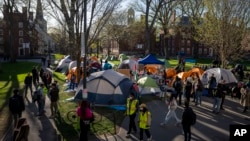
Protesters against the war between Israel and Hamas were voluntarily taking down their tents in Harvard Yard on Tuesday after university officials agreed to discuss their questions about the endowment, bringing a peaceful end to the kinds of demonstrations that were broken up by police on other campuses.
The student protest group Harvard Out of Occupied Palestine said in a statement that the encampment "outlasted its utility with respect to our demands." Meanwhile, Harvard University interim President Alan Garber agreed to pursue a meeting between protesters and university officials regarding the students' questions.
Students at many college campuses this spring set up similar encampments, calling for their schools to cut ties with Israel and businesses that support it.
The Israel-Hamas war began when Hamas and other militants stormed into southern Israel on October 7, killing some 1,200 people and taking 250 hostages. Palestinian militants still hold about 100 captives, and Israel's military has killed more than 35,000 people in Gaza, according to Gaza's Health Ministry, which doesn't distinguish between civilians and combatants.
Harvard said its president and the dean of the Faculty of Arts and Sciences, Hopi Hoekstra, will meet with the protesters to discuss the conflict in the Middle East.
The protesters said they worked out an agreement to meet with university officials, including the Harvard Management Company, which oversees the world's largest academic endowment, valued at about $50 billion.
The protesters' statement said the students will set an agenda that includes discussions on disclosure, divestment, reinvestment and the creation of a Center for Palestine Studies. The students also said that Harvard has offered to retract suspensions of more than 20 students and student workers and back down on disciplinary measures faced by 60 more.
"Since its establishment three weeks ago, the encampment has both broadened and deepened Palestine solidarity organizing on campus," a spokesperson for the protesters said. "It has moved the needle on disclosure and divestment at Harvard."
Chinese students report interrogations, deportations at US airports

Academics from China are reporting increased scrutiny at U.S. airports, with valid visa holders being interrogated and turned away by Customs and Border Protection Agents.
Phones and laptops have been searched, and researchers have undergone extensive questioning about their work. One graduate student at Yale, who was midway through her PhD, was turned back at Dulles airport and banned from entering the U.S. for five years, according to The Guardian.






